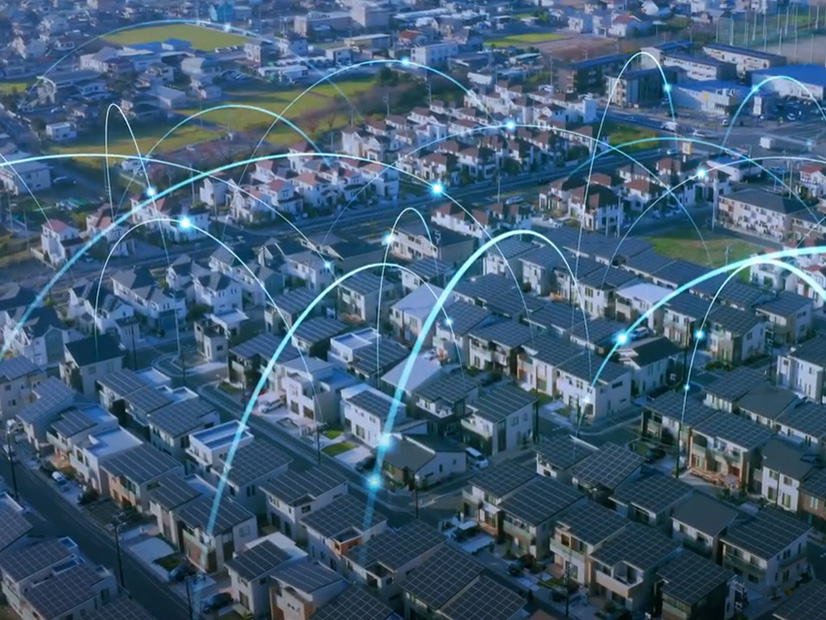
PacifiCorp will receive $6.42 million in Department of Energy funding for a “connected communities” pilot project in Utah that will span apartment buildings, a manufacturing facility, a university laboratory and a mass transit center.
The funding is part of $61 million that DOE has awarded to 10 connected community pilot projects across the U.S. The department announced the funding this month.
Connected communities tie together a group of grid-interactive efficient buildings (GEBs). In addition to improving the energy efficiency of buildings, connected communities use smart controls, sensors and analytics to communicate with the electrical grid.
The goal is to optimize distributed energy resources and reduce the amount of energy needed during periods of peak demand. Utility bills and grid system costs may fall as a result, DOE said.
PacifiCorp’s connected communities project is expected to produce more than 8 MW of flexible load — the highest amount among the 10 pilot projects.
James Campbell, director of innovation and sustainability policy at PacifiCorp subsidiary Rocky Mountain Power, described connected communities as “the grid of the future.”
Smart grids, coupled with increasing amounts of renewable energy, are needed to hit greenhouse gas reduction targets, Campbell said Tuesday during a DOE press conference on the Utah pilot project.
The project includes a diverse group of buildings in the Salt Lake City area. At the Soleil Lofts, an upscale apartment complex in Herriman, rooftop solar and batteries in each unit will run all the appliances and air conditioning, Campbell said.
Soleil Lofts will be connected with a downtown affordable housing project in partnership with the developer, the Giv Group. The connected community will also include a downtown transit station that is a hub for electric trains and where electric buses are being introduced.
Another component of the pilot project is a research lab at Utah State University, which already has a microgrid, as well as an industrial building on the west side of Salt Lake City.
“How do we connect those together, almost in a symphony, to optimize and stabilize the grid?” Campbell said. “So we can actually lower the costs for everybody and also so we can bring on more renewable energy.”
Cybersecurity will be another focus of the project, according to Campbell, who noted the number of components such as solar panels and EV chargers that will be connected directly to the grid.
Rocky Mountain Power will work with the National Association of State Energy Officials (NASEO) and the Edison Electric Institute to evaluate whether the model is one that can be replicated elsewhere.
GEB Interest Growing
The announcement of DOE funding for connected communities projects comes as interest in GEBs is growing. DOE released a report in May laying out a national roadmap for GEBs.
DOE has estimated that GEBs could save up to $18 billion per year in power system costs by 2030 and slash carbon emissions by 80 million tons each year. Buildings account for about 74% of electricity use in the U.S. and 35% of the nation’s energy-related CO2 emissions, the department said.
In California, the state’s Energy Commission held an all-day workshop this month to discuss GEBs. DOE received hundreds of applications for connected communities funding, a department official said during the workshop. (See CEC Explores Grid-interactive Efficient Buildings.)
The 10 projects selected for funding will explore the potential benefits of GEBs across a range of locations, building types and technologies, DOE said in announcing the awards.
“These projects will help universalize technology that can maximize the efficiency and sustainability of America’s nearly 130 million buildings and make significant headway in the fight against climate change,” U.S. Secretary of Energy Jennifer Granholm said in a statement.
Equity Component
In addition, several of the selected projects will bring the economic benefits of GEBs to low-income communities, DOE noted.
One of those is a proposal from the Electric Power Research Institute (EPRI), which will receive $5.27 million for pilot projects in New York City, Seattle and San Diego.
The project will involve retrofitting existing affordable housing complexes in each city into more efficient and connected communities.
As part of the project, EPRI will use data analytics and community energy simulations to help predict the value of energy efficiency, distributed generation and electrification investments, according to Ben Clarin, EPRI’s principal project manager of advanced buildings.
The project will provide technologies such as advanced heat pumps, building envelope systems, water heating systems, and appliances as a way to increase energy efficiency, reduce energy bills, and improve indoor air quality for the communities.
“Finally, the project will look at developing viable business models, knowledge transfer tools, and best practices of how affordable housing providers, community stakeholder groups, and energy companies can work together to develop scalable connected community programs across the country,” Clarin said in an email.
Other Projects
Other connected community pilot projects across the U.S. are receiving DOE funding.
In North Carolina, Ibacos Inc. will test a coordinated control program to optimize the energy use of a variety of distributed energy resources in 1,000 homes in Duke Energy’s service area. The homes are a mix of new and existing buildings, single-family and multifamily homes, and owner-occupied and rental units. The company will receive $6.65 million.
In Oregon, Portland General Electric will receive $6.65 million to renovate more than 500 buildings in North Portland’s historically underserved neighborhoods. The buildings will be upgraded with energy efficiency measures and connected devices.
Ohio State University will receive $4.2 million to see whether its existing on-campus connected community can provide grid services such as frequency regulation, synchronized reserve, and energy and capacity markets participation in a cyber- and data-secure manner.
In California, SunPower Corp. will receive $6.65 million to help develop more than 230 homes in two communities that meet DOE’s zero-energy-ready home qualifications. The project will include solar energy, home energy management systems and community-scale battery storage.
Information on all 10 projects is available here.



